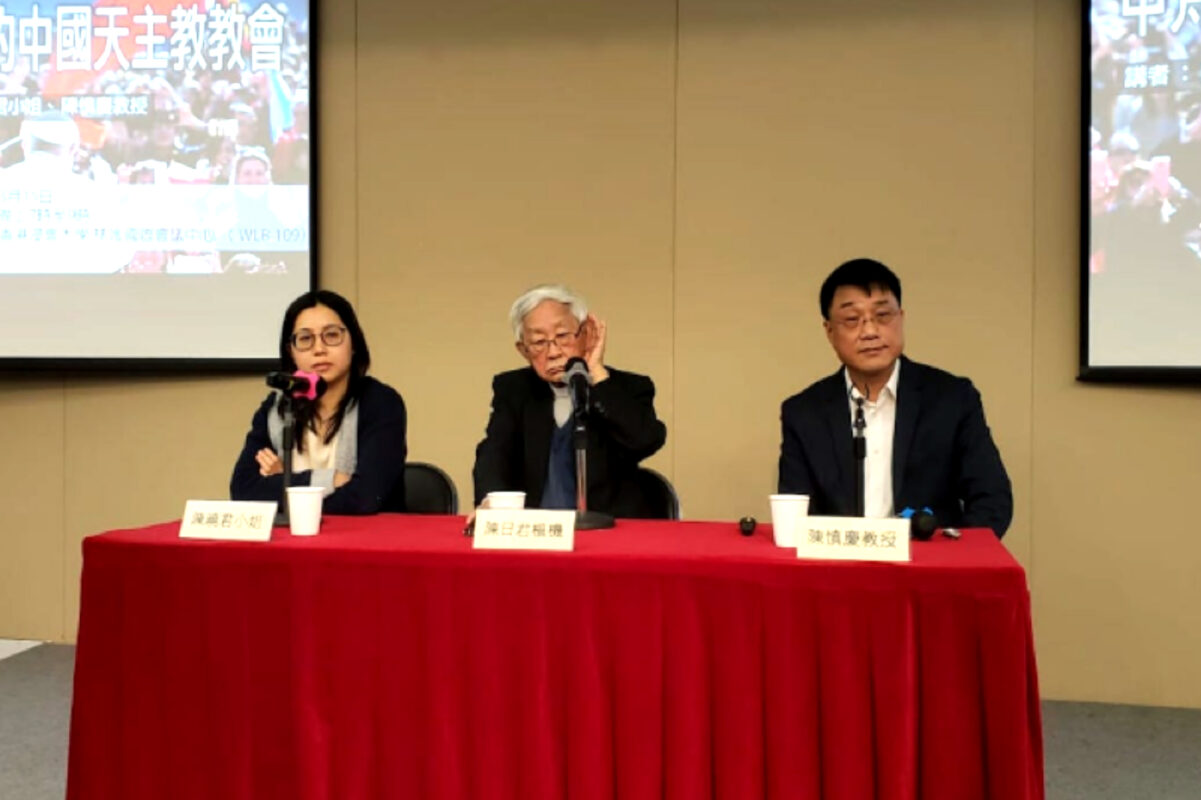CHINA
HK scholar says underground China Church may vanish
Local professor claims priests feel ‘betrayed’ by Sino-Vatican provisional agreement and may form independent movement
ucanews.com reporter, Hong Kong
China
March 22, 2019

Guest speakers Candy Chan (left), Cardinal Joseph Zen (midddle) and Professor Chan Shun-hing listen to a question from the floor during a question-and-answer session during a seminar held at the Baptist University of Hong Kong on March 15. (ucanews.com photo)
The disappointment and resentment caused by the Sino-Vatican provisional agreement will lead to the gradual disappearance of the underground Church in China, according to a Protestant scholar from Hong Kong.
Chan Shun-hing, a professor at the Department of Religion and Philosophy at Hong Kong Baptist University, told a recent seminar that members of the underground Church felt disappointed and betrayed by the Vatican.
He recounted how many priests, who had spent much of their lives in prison, had later insisted on returning to their ministry despite their old age, “because of the perseverance of their conscience.”
However, such acts of conscience are not so respected nowadays, he added.
And without such recognition of their devotion and valor, what else would encourage them to endure such persecution, he asked.
Such religious recognition has sustained the underground community in China for 40 years and helped it resist government control, Chan explained.
But this sudden request that they agree to compromise with the communist government after struggling for so long has “caused them pain,” he told the seminar jointly organized by the Department and Center for Sino-Christian Studies on March 15.
Titled, “The Catholic Church in China under the Sino-Vatican Agreement,” the seminar also welcomed as guest speakers Cardinal Zen Ze-kiun and Candy Chan, director of a two-part TV show that aired in January about the agreement. It was produced by Radio & Television Hong Kong (RTHK), the local government’s public broadcasting service.
RTHK interviewed priests and parishioners on the mainland and asked them for their thoughts about the deal signed last September, especially on how it had impacted the state-sanctioned and underground churches.
Chan said after listening to the comments shared by the priests interviewed by RTHK, he felt “the authority of the Holy See has been weakened” in the wake of the agreement.
In one episode, a priest from the open community wondered why the content of the agreement was not disclosed, which he considered disrespectful.
The episode also showed a priest from the underground community challenging the concept of papal infallibility. Chan said he had heard similar sentiments from many priests in China.
He pointed to a further split in the underground community between those who support the agreement, and those who reject it. The latter also reject the leadership of the Chinese Communist Party (CPP) and the state-controlled Catholic Patriotic Association (CPA), he said.
The professor said he had seen priests from the underground Church leave their service and refuse to join the open community, which he argued would lead to the gradual disappearance of the underground movement altogether.
“I have been able to trace this trend and it is really possible,” he said.
Chan quoted some young people from the TV show as saying if the underground community fails to win the support of the Vatican, no priests would be able to continue their ministry in China.
One young Catholic said he planned to study theology and work as a priest in the Philippines.
The professor questioned if an independent Catholic Church would emerge in China and break away from the Vatican.
Members of the underground community may “remain sincere to their faith and loyal [to God] but break away from the Church’s hierarchy to develop their own church,” Chan said.


 ENG
ENG